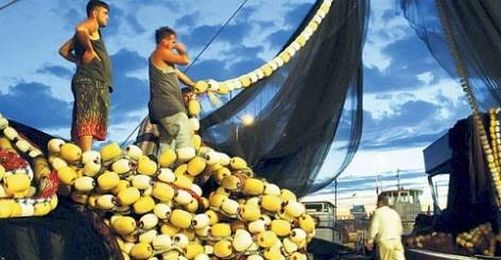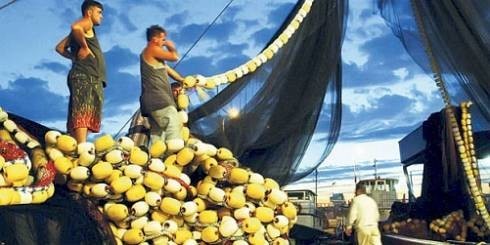New Fishing Regulations Raise Hope on Maritime Conservation


The Ministry of Food, Agriculture and Livestock presented a notice to the Prime Ministry that proposes to restrict the hunting of juvenile fish and the use of dragnets, with only days left before the new fishing season kicks in on Sept. 1.
The notice proposes to raise the length of legal turbot catch from 40 centimeters to 45 centimeters, the length of legal sea bream catch from 20 centimeters to 35 centimeters and the length of sea bass that can be legally hunted from 18 centimeters to 25 centimeters.
The notice also stipulates raising the limits for dragnet fishing from 18 meters to 24 meters deep, while banning the use of dragnets entirely around the Prince Islands in the Sea of Marmara, the Gulf of İzmit and the Bay of Büyükçekmece. If the Prime Ministry ratifies the notice, then sole fish hunting will also be prohibited between Jan 1 and Feb. 1, and turbot hunting will be also banned between April 15 and June 15.
The new regulations will remain in effect for the next four years after they are published in the Official Gazette following the Prime Ministry's approval.
A significant but inadequate leap forward
Greenpeace has been striving for the implementation of certain fundamental rules for sustainable fishing, starting with the "How many cm is yours?" campaign, Greenpeace Mediterranean Oceans Campaigner Banu Dökmecibaşı said, adding that the authorities had introduced restrictions on hunting certain fish species last year, too.
"Turbots were especially important for us because they constitute an endangered species. Further changes are also required, but we are satisfied with the developments for now," Dökmecibaşı said.
The standard in the European Union (EU) for the use of dragnets is 50 meters deep, she said, adding that coastal fishers were also against the use of dragnets in waters shallower than 50 meters.
Nevertheless, raising the limits from 18 meters to 24 meters still represents a significant development, according to Dökmecibaşı.
"The debate in the advisory board focused on a limit of 30 meters. For that reason, [that was] what we were expecting, but the restriction of dragnets in coastal areas, even if only to a small degree, still represents a favorable decision. Though we do not find this adequate, we are guessing the following steps are going to go into force within the next few years," she said.
"Coastal areas are extremely sensitive with respect to habitats. Dragnets should never touch the bottom. These nets should float in mid-waters, but when you use them in waters shallower than 18 meters, it is impossible to avoid touching the sea floor. When it sweeps the sea floor, it both causes damage to the habitat and brushes away the fish eggs, too," she explained.
"Making sure the regulations do not remain solely on paper"
The Bosphorus Strait in Istanbul and the Dardanelles Strait in the northwestern province of Çanakkale are home to important migration routes for fish schools, Dökmecibaşı noted.
The Sea of Marmara should entirely be placed under conservation, and the prohibition of the use of dragnets around the Prince Islands, the Gulf of İzmit and the Bay of Büyükçekmece thus represent a significant development, she said.
"Important progress has come about to achieve sustainable fishing in general. Big fishers used to dominate our fishing industry, and coastal fishers were almost brushed aside, even though coastal fishers constitute about 90 percent of all fishers in Turkey," she added.
Dökmecibaşı also stressed the importance of actually implementing the new regulations and making sure they do not remain solely on paper.
"Authorities banned the sale and hunting of juvenile bluefish last year. They also drew the line at 20 centimeters for bluefish, despite the fact that we had told them the lower limit should be 25 centimeters. Inspection was inadequate, however. We want these regulations to go into force very rapidly, but it takes time for certain things to settle down," Dökmecibaşı said.
"For instance, the issue of trawling had gone off the rails last year, but the Istanbul Governor's Office established commissions to handle this matter, and [they managed to] forestall trawling to a large extent. Progress will gather speed as fishers and consumers grow more conscious," she added. (EKN)
Journalist Ahmet Nesin to Apply for Renunciation of Citizenship

Conscientious Objector Işık Acquitted of ‘Alienating People from Military Service’
.jpg)
The Ones Massacred in Madımak 26 Years Ago Commemorated in Sivas

2019 LOCAL ELECTIONS
HDP MP Paylan: Not a Single Objection by HDP is Accepted Throughout Turkey

Q&A WITH PROF. AKARCA ON MARCH 31 ELECTIONS
'Contrary to Past Elections, Government Spreads Fear While Opposition Gives Hope'





